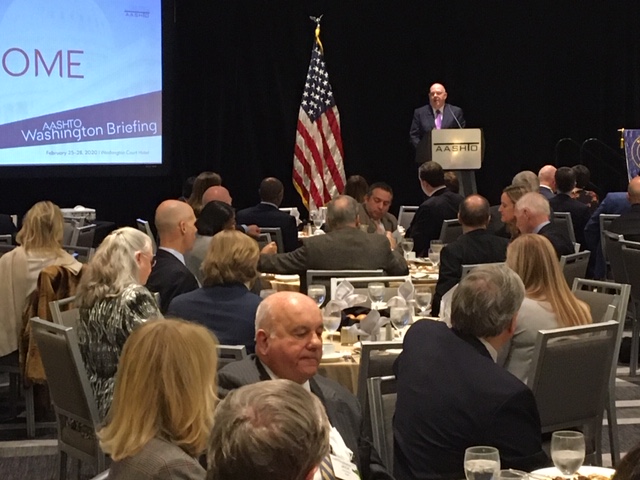Hogan Tight-Lipped on Funding for Signature Infrastructure Initiative

In a speech to a national transportation group Thursday, Gov. Lawrence J. Hogan Jr. said he is “trying” to use his year as head of the National Governors Association to jumpstart a dialogue on infrastructure investment — but he offered no concrete suggestions for how to pay for repairs to the country’s crumbling roads and bridges.
Nor did he hint at any proposals that might be in the pipeline.
Hogan (R) was the keynote speaker on the final day of the American Association of State Highway and Transportation Officials’ annual conference in Washington, D.C.
In a snazzy video before his remarks, Hogan noted that “Infrastructure: Foundation for Success” is the theme of his stint as NGA chair.
Hogan reviewed for his audience actions he has taken as governor (joking that his public-private partnership proposal to widen the Capital Beltway and Interstate 270 “is the largest in the known universe”) and called for Congress to replenish a roads fund set to expire in September. But his 11-minute speech broke no new ground on funding.
He said his goal is to “highlight all the innovation that is going on in your states” and to bring together business leaders, government officials and academics “to come with the best new ideas and innovative solutions in order to solve this infrastructure crisis in America.”
Asked after his speech if he has discussed potential revenue proposals, Hogan said “Yes.” But he declined to elaborate.
“We’re going to continue to talk about it for the rest of the year,” he said brusquely as he sprinted away from a reporter in the lobby of the Washington Court Hotel, site of the four-day conference.
Hogan has hammered state lawmakers for months over their advocating a multi-billion dollar increase in education spending without identifying a funding source.
Political science professor Stephen Farnsworth said it’s no surprise that a politician who catapulted to success on a wave of anti-tax sentiment would be reluctant to identify revenue sources for infrastructure improvements.
“It’s far better [politically] to say you support transportation improvements than to go down the road of supporting a specific plan,” he said. “Politicians don’t like to make hard choices. It’s how they become ex-politicians.”
Hogan isn’t alone in hesitating to identify a funding source for infrastructure. As a candidate, President Trump pledged to find a trillion dollars or more to build new bridges, roads and airports, but he has neglected the issue almost completely since becoming president.
“Conservative politicians can win votes by talking about no tax increases,” said Farnsworth, an author and presidential historian at the University of Mary Washington. “That creates a significant challenge.”
‘If you use it, you should pay for it’
The head of Missouri’s Department of Transportation, Patrick K. McKenna, who is AASHTO’s president, was more willing to discuss ways to fund infrastructure improvements.
“For 100 years, user fees have done it,” McKenna said, referring to add-on fees consumers pay for a range of services, including highways and utility upgrades.
The rise of fuel-efficient cars has crimped the flow of revenue into state transportation funds. Gas taxes — which are regressive — haven’t kept pace with inflation, so officials must devise a work-around, McKenna said.
“Adjusting to a new basis of user fee is the appropriate thing,” he said. “The disagreement comes on how.”
McKenna said a transition from the gas tax to a road-user charge, perhaps indexed to make it less regressive, has promise.
“I’m hearing those things in conversations with people on the Hill,” he said. “Everybody is looking for that middle ground.”
AASHTO focuses on transportation, but the nation’s infrastructure challenge is broader than roads and rail. It also encompasses water and sewer systems, ports, cyber-security and more, McKenna said.
Consumers may not like paying the added charges, but those fees represent an opportunity to create revenue for repairing infrastructure and generating jobs, he said.




 Creative Commons Attribution
Creative Commons Attribution